|
Music Reviews
Alternative
Blues
Books
Christmas
Classic Rock
Country
Jazz
Lounge
Oldies
Power Pop
Punk & New Wave
Reggae
Rhythm & Blues
Seventies
Texas
Special Features
Randy's Rodeo
Sex Pistols
Motown
Halloween
Valentine's Day
Information
About Me
Feedback
Links
User's Guide
Support Me
Amazon
iTunes
Sheet Music Plus
|
Sock it to me, Santa! Visit my other website, www.hipchristmas.com Visit my other website, www.hipchristmas.com
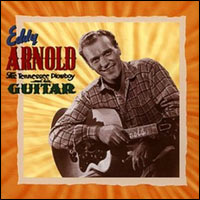 The
smooth style and middle-class image Eddy
Arnold developed in the 1960's qualifies him as the Perry Como of country music,
but he cut some fine records along the way. He conducted a career demonstrably longer
and more successful than any country star before or since, spreading hundreds of
hit singles over five decades. Billboard still lists him as the #1 country artist of all time - a record unlikely to ever be broken. Arnold's influence, however, ultimately ruined country
music. Long the provenance of crazed hillbillies and lonesome cowboys, country began
its long descent into mainstream mediocrity thanks to Eddy (and, let's be fair,
others like producers Chet Atkins and Billy Sherrill).
But Eddy Arnold's records - at least the ones produced during his first 20 years
- have stood well the test of time. And, his easygoing demeanor and unprecedented
popularity brought country music to the masses, opening the doors for Hank Williams,
Patsy Cline, and countless others. By elevating country music, Eddy Arnold destroyed
it, but we can't really blame him for that.... The
smooth style and middle-class image Eddy
Arnold developed in the 1960's qualifies him as the Perry Como of country music,
but he cut some fine records along the way. He conducted a career demonstrably longer
and more successful than any country star before or since, spreading hundreds of
hit singles over five decades. Billboard still lists him as the #1 country artist of all time - a record unlikely to ever be broken. Arnold's influence, however, ultimately ruined country
music. Long the provenance of crazed hillbillies and lonesome cowboys, country began
its long descent into mainstream mediocrity thanks to Eddy (and, let's be fair,
others like producers Chet Atkins and Billy Sherrill).
But Eddy Arnold's records - at least the ones produced during his first 20 years
- have stood well the test of time. And, his easygoing demeanor and unprecedented
popularity brought country music to the masses, opening the doors for Hank Williams,
Patsy Cline, and countless others. By elevating country music, Eddy Arnold destroyed
it, but we can't really blame him for that....
Eddy Arnold was born in 1918 and raised on a family farm in the Volunteer State,
an upbringing that later earned him the nickname of "Tennessee Plowboy." His
father died when Eddy was just 11-years-old, and the farm was soon auctioned off
by creditors. At the height of the Great Depression, the Arnolds began sharecropping,
and young Eddy's precocious musical talents helped support the family. He played
for peanuts at church socials and country fairs and, by the age of 17, had turned
professional in earnest. According to published accounts, Eddy Arnold vowed to never
be poor again, and this ambition helps explain both his imminent success and his
later willingness to compromise his art for mainstream acceptance.
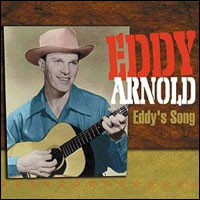 Eddy
kicked around honky tonks in Jackson, Tennessee, making his radio debut there in
1936 and later gracing broadcasts from Memphis and St. Louis. His garnered first
big break by joining Pee Wee King's Golden West Cowboys in 1940, gaining access
to stages as illustrious as the Grand Old Opry. In 1943, Eddy Arnold began performing
under his own name and, in 1944, he signed to RCA Records. Within a year, the race
was on. Beginning with "Each Minute Seems A Million Years," Arnold spun
a string of 58 (count 'em) Top 10 country chart appearances that continued unbroken
for a decade; moreover, many of these country hits crossed over to the pop charts.
Among Eddy's most notable records during this period were "That's How Much
I Love You," "It's A Sin," "Bouquet Of Roses," and "I'll
Hold You In My Heart (Till I Can Hold You In My Arms)." Records like those
form Arnold's lasting legacy; no matter what you think of Arnold's later career,
these sterling early recordings belong in the collection of any country music fan. Eddy
kicked around honky tonks in Jackson, Tennessee, making his radio debut there in
1936 and later gracing broadcasts from Memphis and St. Louis. His garnered first
big break by joining Pee Wee King's Golden West Cowboys in 1940, gaining access
to stages as illustrious as the Grand Old Opry. In 1943, Eddy Arnold began performing
under his own name and, in 1944, he signed to RCA Records. Within a year, the race
was on. Beginning with "Each Minute Seems A Million Years," Arnold spun
a string of 58 (count 'em) Top 10 country chart appearances that continued unbroken
for a decade; moreover, many of these country hits crossed over to the pop charts.
Among Eddy's most notable records during this period were "That's How Much
I Love You," "It's A Sin," "Bouquet Of Roses," and "I'll
Hold You In My Heart (Till I Can Hold You In My Arms)." Records like those
form Arnold's lasting legacy; no matter what you think of Arnold's later career,
these sterling early recordings belong in the collection of any country music fan.
Not content to rule Nashville, Eddy Arnold appeared in Hollywood movies, played
Las Vegas casinos, and hosted TV shows, eventually becoming the first country star
to host his own nationally-broadcast program, Eddy Arnold Time,
in 1955. With the help of his manager, Col. Tom Parker (who later rose to infamy
manipulating Elvis Presley), Eddy Arnold had secured his financial future. In the
mid-50's, however, rock 'n' roll dealt a body blow to country music. Sales of country
records - Arnold's included - fell off, and he entered a relatively fallow period.
The seeds of his next major success, however, were already planted. With songs
like "I Really Don't Want To Know" (1954) and "You Don't Know Me" (1956),
Arnold had already begun to soften his sound while continuing to cut straight-ahead
country singles ("Just Call Me Lonesome," 1955). More and more, Arnold
and his producers (Chet Atkins, mainly) were piling strings and vocal choruses
on top of traditional country combos. In Eddy's own words, "I went in and
did something with violins, and 'Boom!'"
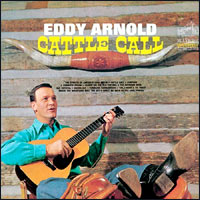 Later
known as "countrypolitan," an urbane fusion of pop and country, Arnold's
new records were essentially pop records with superficial country trappings (the
occasional steel guitar, for instance). Some of the songwriting, however, was superlative,
and Arnold's voice was still as smooth as honey. During the late 50's and early
60's, Eddy charted consistently with many such records, and he undertook the recording
a number of his older hits in this new style - usually to ill effect. But, under
new management, his career exploded again in the mid-60's when his sound (and look)
took another hard right turn. Trading in his string tie for a tuxedo, Arnold waxed
the records for which he is most fondly remembered by his fans, including "What's
He Doing In My World" (1965) and "Make The World Go Away" (1966),
his first Top 10 pop hit. By the 1970's however, Eddy Arnold's music - already
on shaky legs - had descended to the level of rank muzak. Later
known as "countrypolitan," an urbane fusion of pop and country, Arnold's
new records were essentially pop records with superficial country trappings (the
occasional steel guitar, for instance). Some of the songwriting, however, was superlative,
and Arnold's voice was still as smooth as honey. During the late 50's and early
60's, Eddy charted consistently with many such records, and he undertook the recording
a number of his older hits in this new style - usually to ill effect. But, under
new management, his career exploded again in the mid-60's when his sound (and look)
took another hard right turn. Trading in his string tie for a tuxedo, Arnold waxed
the records for which he is most fondly remembered by his fans, including "What's
He Doing In My World" (1965) and "Make The World Go Away" (1966),
his first Top 10 pop hit. By the 1970's however, Eddy Arnold's music - already
on shaky legs - had descended to the level of rank muzak.
Collecting the music of Eddy Arnold is no easy task, in no small part because
his legacy has been poorly served by RCA, his label for the bulk of his career.
Let's take stock: Eddy Arnold notched 140 chart entries spanning five decades,
selling over 85 million records. The man had 28 #1 hits alone! (No, really - and they're all on Real Gone Music's Complete Original #1 Hits.) I mean,
he had so many hits that one of his hits ("Eddy's Song") consisted of
the titles of his other hits! By now, RCA should have produced a substantial boxed
set; instead, they have persisted in regurgitating roughly the same predictable
batch of tracks under a new cover every year or so. Hence, relatively few of these
vital recordings remain in print, and those that are must be purchased in piecemeal
fashion. Plus, RCA freely licenses Arnold's masters to budget labels, leaving consumers
to navigate a minefield of shoddy packages, lackluster masters, and inferior re-recordings.
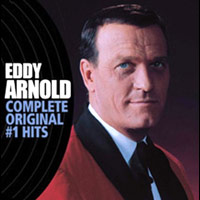 One
shining exception to this infuriating trend is The
Tennessee Plowboy And His Guitar, a 5-CD box from German label Bear Family.
This treasure trove exhaustively documents Eddy's early, twangy years (1944-1950)
and is a must-own for hard-core country aficionados. Obviously, though, the Tennessee
Plowboy box is just one piece of the puzzle (albeit the really good piece),
and its hefty price tag will be out-of-reach for most consumers. Thankfully, Eddy's
Song, a 4-CD box on English budget imprint Proper, culls nearly 100 tracks
from roughly the same period. Though hardly the equivalent of Bear Family's stellar
box, Eddy's
Song is surprisingly well mastered and annotated, and it retails for scarcely
twenty bucks. What a deal! Personally, I find much to enjoy in Eddy Arnold's later
career (at least through the late 60's), but any self-righteous shit-kickers who
find Eddy's countrypolitan sound too easy on the ears will certainly appreciate
in his seminal early music. One
shining exception to this infuriating trend is The
Tennessee Plowboy And His Guitar, a 5-CD box from German label Bear Family.
This treasure trove exhaustively documents Eddy's early, twangy years (1944-1950)
and is a must-own for hard-core country aficionados. Obviously, though, the Tennessee
Plowboy box is just one piece of the puzzle (albeit the really good piece),
and its hefty price tag will be out-of-reach for most consumers. Thankfully, Eddy's
Song, a 4-CD box on English budget imprint Proper, culls nearly 100 tracks
from roughly the same period. Though hardly the equivalent of Bear Family's stellar
box, Eddy's
Song is surprisingly well mastered and annotated, and it retails for scarcely
twenty bucks. What a deal! Personally, I find much to enjoy in Eddy Arnold's later
career (at least through the late 60's), but any self-righteous shit-kickers who
find Eddy's countrypolitan sound too easy on the ears will certainly appreciate
in his seminal early music.
But, what of that later material - the music most fans will covet? First off,
avoid the original RCA albums Best
Of Eddy Arnold (1966) or Best
Of Eddie Arnold Vol. 2 (1970). Nostalgia value notwithstanding, these CD reissues
suffer from poor sound quality and a pittance of tracks. Instead, pick up that
same label's Ultimate
Eddie Arnold (2003) or the earlier Essential
Eddy Arnold (1996), both containing a generous 20 tracks. Ultimate is
easily the superior package, surveying Eddy's prime first two decades in chronological
order; with the possible exception of the aforementioned Complete Original #1 Hits, it is the smartest, most even-handed overview of Arnold's music ever compiled. While Complete Original #1 Hits has more tracks (28), it skips a few really wonderful songs that didn't make it to the top of the charts (including "Trouble In Mind" and "You Don't Know Me"). On the other hand, Essential covers
more ground than either of them (1946-1990), but that all that really means is later, weaker material - plus it substitutes some
bowdlerized 60's remakes of some important vintage hits. No matter your preference,though,
each CD is an adequate primer. Finally, ASV's Early
Hits Of The Tennessee Plowboy, a 25-song, single-disc survey of Arnold's early
hillbilly material that scarcely overlaps with Essential, Ultimate,
or Complete is an excellent companion for fans with broad tastes but shallow pocketbooks.
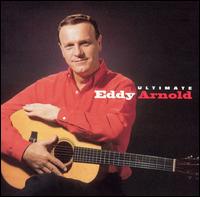 Venturing
beyond the hits is where RCA's negligence really hurts. Nearly everything else
on the market is inferior in some way to the CD's discussed above - crappy compilations
for unschooled chumps. Bearing in mind that RCA didn't start issuing long-playing,
12-inch records until the mid-50's, very few of Eddy Arnold's original LP's have
been transferred intact to compact disc. Most significant is Cattle
Call (1963), a milestone both in Arnold's career - it was his first album to
enter the pop charts - and in the ongoing canonization of the American cowboy. Cattle
Call consists mainly of modern songs about the Old West, including a new version
of Arnold's title track (which he first cut in 1955). Awhile back, Bear Family
issued a wonderful CD comprising both Cattle
Call and another western-themed LP, Thereby
Hangs A Tale (1959). More recently, Collector's Choice issued Cattle
Call with in a refurbished, stand-alone
version. Venturing
beyond the hits is where RCA's negligence really hurts. Nearly everything else
on the market is inferior in some way to the CD's discussed above - crappy compilations
for unschooled chumps. Bearing in mind that RCA didn't start issuing long-playing,
12-inch records until the mid-50's, very few of Eddy Arnold's original LP's have
been transferred intact to compact disc. Most significant is Cattle
Call (1963), a milestone both in Arnold's career - it was his first album to
enter the pop charts - and in the ongoing canonization of the American cowboy. Cattle
Call consists mainly of modern songs about the Old West, including a new version
of Arnold's title track (which he first cut in 1955). Awhile back, Bear Family
issued a wonderful CD comprising both Cattle
Call and another western-themed LP, Thereby
Hangs A Tale (1959). More recently, Collector's Choice issued Cattle
Call with in a refurbished, stand-alone
version.
Another label, Collectables (seldom noted for their strict quality control), has
begun issuing CD two-fers comprised of LP's released through Camden, RCA's budget
imprint. An odd choice, for sure, but they're good albums nonetheless. One disc
spans That's
How Much I Love You (1959) and More
Eddy Arnold (1960), while another documents Country
Songs I Love To Sing (1963) and Eddy's
Songs (1964). Let's hope that Collectables (or someone) continues this trend,
eventually restoring the legacy of the Tennessee Plowboy to it's full glory.
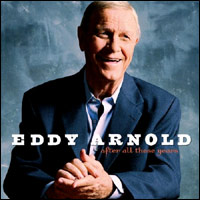 And
what of that legacy? Well, Eddy Arnold was elected to the Country
Music Hall Of Fame in 1966 at the peak of his pop-fueled comeback. Irony noted,
but it was an honor richly deserved. If, like Patsy Cline or Hank Williams, Arnold
had crashed and burned in his prime, we wouldn't be having this discussion. Very
little of what Eddy cut after the late 1960's is worth a listen - in fact, those
records are apt to drive staunch country traditionalists to distraction. But if
Hank and Patsy had lived, they probably would have mellowed, too, and might be
churning out the oldies in Branson as we speak. Maybe not, but Eddy Arnold aged
with dignity and grace, and that's more than can be said for the whiskey-soaked
denouement of many a Nashville star. And
what of that legacy? Well, Eddy Arnold was elected to the Country
Music Hall Of Fame in 1966 at the peak of his pop-fueled comeback. Irony noted,
but it was an honor richly deserved. If, like Patsy Cline or Hank Williams, Arnold
had crashed and burned in his prime, we wouldn't be having this discussion. Very
little of what Eddy cut after the late 1960's is worth a listen - in fact, those
records are apt to drive staunch country traditionalists to distraction. But if
Hank and Patsy had lived, they probably would have mellowed, too, and might be
churning out the oldies in Branson as we speak. Maybe not, but Eddy Arnold aged
with dignity and grace, and that's more than can be said for the whiskey-soaked
denouement of many a Nashville star.
In fact, having been blessed with good health and longevity, Eddy Arnold was granted
the opportunity to write his own final chapter. At age 87 (60 years after his first
RCA release), Arnold waxed his 100th album, After
All These Years (2005) - his planned final recordings. On songs like "Old
Porch Swing" and "If I Had Lived My Life Without You," Eddy looks
wistfully back on a life well spent. Assisted by the understated production of
Cowboy Jack Clement, Arnold - his voice now hushed and occasionally strained -
acquits himself nicely, even if his hoarse croon evokes more than a little pity.
Compared to, say, the final recordings of Johnny Cash, After
All These Years is no masterpiece. Yet it's a gentle, touching collection of
songs - and a fitting postscript to Arnold's long, profitable career. Less than three years later, Eddy died as he lived - peacefully - at age 89.
It could be said that without Eddy Arnold - or, more to the point, his unblinking
willingness to cater to the mainstream - we might have no Lee Greenwood, no Garth
Brooks, no Toby Keith. In short, country music would be better off. But, the legacy
of an artist is more than progeny spawned. Nirvana, after all, begat Silverchair,
and Jimi Hendrix bequeathed us Robin Trower. Miles Davis's experiments with fusion
planted the seeds that eventually spewed forth smooth jazz - and Kenny G!
Yet, no one doubts the merits of those musical giants. So, while the value of Eddy
Arnold's later music is certainly debatable, and he undoubtedly helped mollify
Nashville's precious rebel soul, his pristine country records from the 40's and
50's speak for themselves - if you will but listen. [top of page]
 Selected Eddy
Arnold Albums Selected Eddy
Arnold Albums
[top of page]
 Essential Eddy
Arnold Songs Essential Eddy
Arnold Songs
- Anytime (1948)
- Bouquet Of Roses (1948)
- Cattle Call (1955)
- Cuddle Buggin' Baby (1950)
- Don't Rob Another Man's Castle (1949)
- Each Minute Seems a Million Years (1945)
- Easy On The Eyes (1952)
- Eddy's Song (1953)
- Full Time Job (1952)
- I Really Don't Want To Know (1954)
- I Wanna Play House With You (1951)
- I Want To Go With You (1966)
- I Wouldn't Know Where To Begin (1956)
- I'll Hold You In My Heart (Till I Can Hold You In My Arms) (1947)
- I'm Throwing Rice (At the Girl I Love) (1949)
- I've Been Thinking (1955)
- It's A Sin (1947)
- Just A Little Lovin' (Will Go a Long, Long Way) (1948)
- Just Call Me Lonesome (1955)
- Kentucky Waltz (1951)
- Last Word In Lonesome Is Me (1966)
- Lonely Again (1967)
- Lovebug Itch (1951)
- Make The World Go Away (1965)
- Molly Darlin' (1948)
- My Daddy Is Only a Picture (1948)
- One Kiss Too Many (1949)
- Somebody Like Me (1961)
- Somebody's Been Beatin' My Time (1951)
- Take Me In Your Arms And Hold Me (1950)
- Tennessee Stud (1959)
- Texarkana Baby (1948)
- That Do Make It Nice (1955)
- That's How Much I Love You (1946)
- Then You Can Tell Me Goodbye (1968)
- There's Been A Change In Me (1951)
- They Don't Make Love Like They Used To (1969)
- Tip Of My Fingers (1966)
- Trouble In Mind (1956)
- Turn The World Around (1967)
- What a Fool I Was (1948)
- What Is Life Without Love (1947)
- What's He Doing In My World (1965)
- You Don't Know Me (1956)
[top of page]
 The Eddy
Arnold Bookshelf The Eddy
Arnold Bookshelf
[top of page]
 Eddy
Arnold On The Web Eddy
Arnold On The Web
[top of page]
 Feedback Feedback
Your witty comments, impertinent questions, helpful suggestions, and angry denials
are altogether encouraged. Submit feedback via email;
submissions will be edited and posted at my discretion.
|
|